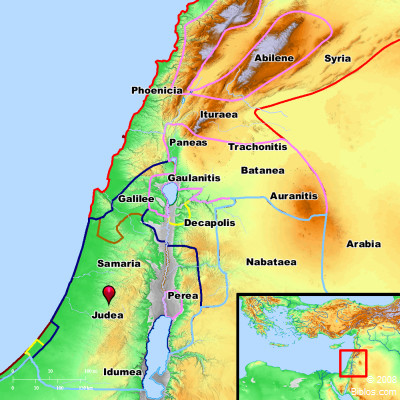
 According to John 3:22-36 Verses 22-30 Verses 31-36
According to John 3:22-36 Verses 22-30 Verses 31-36
After these things Jesus and His disciples came into the land of Judea, and there He was spending time with them and baptizing. John also was baptizing in Aenon near Salim, because there was much water there; and people were coming and were being baptized— for John had not yet been thrown into prison. Therefore there arose a discussion on the part of John’s disciples with a Jew about purification. And they came to John and said to him, “Rabbi, He who was with you beyond the Jordan, to whom you have testified, behold, He is baptizing and all are coming to Him.” John answered and said, “A man can receive nothing unless it has been given him from heaven. “You yourselves are my witnesses that I said, ‘I am not the Christ,’ but, ‘I have been sent ahead of Him.’ “He who has the bride is the bridegroom; but the friend of the bridegroom, who stands and hears him, rejoices greatly because of the bridegroom’s voice. So this joy of mine has been made full. “He must increase, but I must decrease.
“He who comes from above is above all, he who is of the earth is from the earth and speaks of the earth. He who comes from heaven is above all. “What He has seen and heard, of that He testifies; and no one receives His testimony. “He who has received His testimony (he, or, He) has set his seal to this, that God is true. “For He whom God has sent speaks the words of God; for He gives the Spirit without measure. “The Father loves the Son and has given all things into His hand. “He who believes in the Son has eternal life; but he who does not obey the Son will not see life, but the wrath of God abides on him.”
Commentary
Verses 22-30
22. After these things Jesus and His disciples came into the land of Judea, and there He was spending time with them and baptizing. 23. John also was baptizing in Aenon near Salim, because there was much water there; and people were coming and were being baptized—24. for John had not yet been thrown into prison. Remember this portion of John is commonly accepted as chronological, both Jesus and John are baptizing. This is immediately after Jesus nighttime encounter with Nicodemus which inserts this chronological event that is absent in the other gospel accounts. The land of Judea is the region west of the northern portion of the Dead Sea. Samaria, which will be our location in chapter 4, is immediately to its north with Galilee beyond and immediately westward to the Sea of Galilee. Jesus is having a time that would be considered as a righteous blend of relaxation (spending time with them) and ministry (baptizing). Why do you think the author of this gospel, John, felt that he had to make the comment in verse 24? I believe that he wanted to make sure that the life and self awareness proclamation was known. John wanted to make sure that the Baptizer's perspective of Jesus was known. The Baptizer's life was as important as his death. 25. Therefore there arose a discussion on the part of John’s disciples with a Jew about purification. There was a discussion with a Jew about purification? The discussion might have surface in light of water baptism and its role in spiritual cleansing. Also the discussion is the issue as John the Baptist's ministry relates to the ministry of Jesus. If Jews are discussing 'purification,' it is imperative that we understand more concerning 'purification.' This is not the first occurrence of this word in John's gospel. It was previously used in its accusative form in 2:6 referring to the purifying of the water pots at the wedding in Cana (See also Hebrews 3:1). The Greek word καθαρισμοῦ means cleansing or purification. It is in the Singular Masculine Genitive of Comparison (denoting the person or thing being compared when used with comparative adjectives, adverbs or verbs expressing the idea of comparison) or Genitive of Source (expressing the idea of source). If our Genitive is one of Comparison, then the discussion relates to the Baptism of John compared to the baptism of Jesus, etc. If it is taken as a genitive of source then the discussion regards the source of purification: i.e. God, Jesus, John the Baptist, the water, the Spirit, etc. The genitive word here comes from the root word katharizo meaning a washing off, i.e. (ceremonially) ablution, (morally) expiation -- cleansing, + purge, purification(-fying). The purification did not concern economic or political except where a ceremonially or morally clean lifestyle would affect one state of affairs. Be sure to recall that this issue arose out of a conversation with a Jew. There are four occurrences of this verb in the Singular Masculine Genitive construction besides John 3:25. Each translates this verb as 'purification' or 'cleansing.'
Mark 1:44 καὶ λέγει αὐτῷ· ὅρα μηδενὶ μηδὲν εἴπῃς, ἀλλὰ ὕπαγε σεαυτὸν δεῖξον τῷ ἱερεῖ καὶ προσένεγκε περὶ τοῦ καθαρισμοῦ σου ἃ προσέταξεν Μωϋσῆς, εἰς μαρτύριον αὐτοῖς.
and said to him, "See you say nothing to anybody, but go show yourself to the priest, and offer for your cleansing the things which Moses commanded, for a testimony to them."
Luke 2:22 Καὶ ὅτε ἐπλήσθησαν αἱ ἡμέραι τοῦ καθαρισμοῦ αὐτῶν κατὰ τὸν νόμον Μωϋσέως, ἀνήγαγον αὐτὸν εἰς Ἱεροσόλυμα παραστῆσαι τῷ κυρίῳ,
When the days of their purification according to the law of Moses were fulfilled, they brought him up to Jerusalem, to present him to the Lord.
Luke 5:14 καὶ αὐτὸς παρήγγειλεν αὐτῷ μηδενὶ εἰπεῖν, ἀλλὰ ἀπελθὼν δεῖξον σεαυτὸν τῷ ἱερεῖ καὶ προσένεγκε περὶ τοῦ καθαρισμοῦ σου καθὼς προσέταξεν Μωϋσῆς εἰς μαρτύριον αὐτοῖς.
He commanded him to tell no one, "But go your way, and show yourself to the priest, and offer for your cleansing according to what Moses commanded, for a testimony to them."
2 Peter 1:9 ᾧ γὰρ μὴ πάρεστιν ταῦτα τυφλός ἐστιν μυωπάζων, λήθην λαβὼν τοῦ καθαρισμοῦ τῶν πάλαι αὐτοῦ ἁμαρτιῶν.
For he who lacks these things is blind, seeing only what is near, having forgotten the cleansing from his old sins.
The “argument (in John 3:25) centered on the relative merits of the baptism of John and Jesus.” A Grammatical Analysis of the Greek New Testament, Zerwick, Rome, 1993, p. 293.
The Septuagint, which is the Greek translation of the Hebrew Old Testament, translates Exodus 26: 35-37using καθαρισμοῦ regarding the purifying for the altar.
Exodus 29:35-37 “ 35 Thus you shall do to Aaron and to his sons, according to all that I have commanded you; you shall ordain them through seven days. 36“Each day you shall offer a bull as a sin offering for atonement, and you shall purify the altar when you make atonement for it, and you shall anoint it to consecrate it. 37 "For seven days you shall make atonement for the altar and consecrate it; then the altar shall be most holy, and whatever touches the altar shall be holy.”
27. John answered and said, “A man can receive nothing unless it has been given him from heaven. 28. “You yourselves are my witnesses that I said, ‘I am not the Christ,’ but, ‘I have been sent ahead of Him.’ Here is John's answer to his disciples. Only gifts from heaven matter. All leadership charisma, all influence, all authority, all prestige, all genuine honor comes as a gift, not as a reward based on merit, from heaven. Then, John, with words that will ring through eternity, proclaims 'I am not the Christ.' I will say it again, this man knew who he was and he knew who he wasn't! He was a forerunner, a servant of HIM.
29. “He who has the bride is the bridegroom; but the friend of the bridegroom, who stands and hears him, rejoices greatly because of the bridegroom’s voice. So this joy of mine has been made full. 30. “He must increase, but I must decrease. I am continuously amazed that the Bible couches many of its teachings in family terms. Here in verse 29 and 30 John uses the wedding ceremony to communicate his subservient role to Jesus. Think with me for a moment. Do you ladies remember the name of your husband's best man in your wedding? This should be the easiest to answer. Next, do you remember the names of the best men in the wedding of your siblings? Do you remember the name of best men in the weddings of your children? I hope, by now, that you are seeing how the 'friend of the bridegroom' decreases while the bridegroom increases. "Increase" αὐξάνειν Present Active Infinitive from αὐξάνω meaning: grow up, increase in power, strengthen ; exalt by one's deeds, glorify, extol, honor; of an orator, amplify, exaggerate; also, to sacrifice (Little-Scott-Jones Lexicon). "Decrease" ἐλαττοῦσθαι from ἐλαττόω meaning: make less or smaller, diminish, reduce in amount, in early writers, lower, degrade; cut down, shorten, detract from, reduce the power of (Little-Scott-Jones).Again, John the Baptist knew who he was, his place and his role in the scope of the Big Picture, the epic, eternity, etc. And, most importantly, John the Baptist knew who Jesus was, Jesus' place, and Jesus' role in the scope of the Big Picture.
Verses31-36
31. “He who comes from above is above all, he who is of the earth is from the earth and speaks of the earth. He who comes from heaven is above all. Honestly, my best shot at understanding and commenting on Scripture pales in comparison to Scripture commenting on Scripture. The passage below from the Letter to the Colossians was written by Paul who was religious Jewish renegade ransomed by Jesus Christ. Here is portion of his communication to the Gentiles in Colossae.
Colossians 1: 15-20 "He is the image of the invisible God, the firstborn of all creation. For by Him all things were created, both in the heavens and on earth, visible and invisible, whether thrones or dominions or rulers or authorities—all things have been created through Him and for Him. He is before all things, and in Him all things hold together. He is also head of the body, the church; and He is the beginning, the firstborn from the dead, so that He Himself will come to have first place in everything. For it was the Father’s good pleasure for all the fullness to dwell in Him, and through Him to reconcile all things to Himself, having made peace through the blood of His cross; through Him, I say, whether things on earth or things in heaven.
32. “What He has seen and heard, of that He testifies; and no one receives His testimony.33. “He who has received His testimony (he, or, He) has set his seal to this, that God is true. First notice the utter rejection of Jesus and His message. Even His closets disciples did not fully comprehend His purpose and His passion. John the Baptist was probalby the first to grasp who Jesus was and who he was in the big picture of Jesus' passion. Next lets look at the setting of one's seal. The word translated in the New American Standard Bible as "seal" is the Greek word ἐσφράγισεν in the third person aorist active indicative singular form from the root sphragis meaning: to stamp (with a signet or private mark) for security or preservation (literally or figuratively); by implication, to keep secret, to attest -- (set a, set to) seal up, stop. Metaphorical meaning in John 3:33- “set a seal of approval upon, confirm,” also in Romans 15:28 – “assure them of it.”
If one receives or believes or trust in His message then they confirm or approve of it. But to what are those that receive laying claim? To this: ὁ θεὸς ἀληθής ἐστιν. If ever learn any Greek, you should know this expression: "God is true." 34. “For He whom God has sent speaks the words of God; for He gives the Spirit without measure. This is a verse anticipating the often mentioned subject of the Gospel of John, the coming or giving of the Holy Spirit. Noted the unreserved measure of the One whose chief end is to point us to Jesus. The Book of Acts is the historical account of the early Church written through the eyes of Luke the physician.
Acts 1:4-5 On one occasion, while he was eating with them, he gave them this command: “Do not leave Jerusalem, but wait for the gift my Father promised, which you have heard me speak about. For John baptized with water, but in a few days you will be baptized with the Holy Spirit.”Acts 11:16 Then I remembered what the Lord had said: ‘John baptized with water, but you will be baptized with the Holy Spirit.’
35. “The Father loves the Son and has given all things into His hand. This is respite of the previous thought in verse 31. However, John the Baptist feels the need to repeat this, as does Paul in Colossians. ALL THINGS ARE GIVEN INTO JESUS' HAND. 36. “He who believes in the Son has eternal life; but he who does not obey the Son will not see life, but the wrath of God abides on him.” This phrase from the mouth of John the Baptist echoes the most well know yet least believed phrase of John 3:16. However, John includes the use of the Greek words δὲ and ἀλλ’. δὲ in the first part is commonly translated 'but, and .' The semicolon does us no favors in demarcating that this is a separate contrasting thought. The best translation for δὲ is 'and' signifying a continuing thought. The Greek ἀλλ’ introducing the wrath of God is a strong contrast to the preceding life issues with the Son. This is one of the most significant words in any language and is true in Greek. It is a word of contrast and draws a strong line of distinction between what precedes and follows it. The contrast serves to heighten the thought that the Son is God (John 1), He is to be obeyed (John 2), He must be believed in for He is Life and Blessing which is the absence of the wrath of God. He has the authority of God. Reject Jesus and reject God and thereby have wrath abiding on you. 'Abiding' (μένει from μένω meaning to stay, abide, remain) is the same word used by John later in his gospel to describe a disciples relationship with Jesus.
SUMMARY
Following Jesus will cost you something, but, NOT following Jesus will cost you more. Following Jesus yields Life Eternal. Not following Jesus will bring on the wrath of God. Note that God does not force life or wrath on you. To some degree the choice is yours, choose you this day. You choose whether to have life or wrath based on whether you choose to follow Jesus or not. Life is all about HIM.
The issue of cleansing and purification are essential in this section of the Gospel of John. Those issues are also essential to you. On what basis do you consider yourself clean? Who do you exalt when conversing about cleansing, assuming you have talked about cleansing? Do you exalt a friend, family member, preacher, boss, a prayer, a religion, a church, a president, a nation, political party, a car, a dress, a necklace, a charm pendant, or even yourself? To the degree we exalt any of those things as the basis of our purification, we are just like John's disciples and need to corrected. It is all about HIM, the Christ, Jesus.
John the Baptist is a godly example of the balance of our ministry efforts and the total subservience to the ministry of Jesus. It is all about Him. In that, we are to know our place, our purpose and our passion. Our place is to be a servant to the Bridegroom, that is Jesus. We are to usher Him in or to support Him in His pursuit of His Bride, the Church. Then we are to work, not for our kingdom, but for the Kingdom of God. Nothing we pursue should rise above Him and His Kingdom. This passion for Him is superior to every earthly passion, even the desire to increase in significance. It is all about HIM.
Let us know if we can be of any further assistance: FLSMinistries@bellsouth.net


 "Where is Capernaum?
"Where is Capernaum?